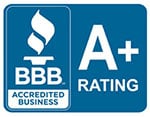3 Reasons Why You Shouldn't Install Vinyl Siding In The Fall
The weather is getting cooler, the kids are back in school, and the smell of Pumpkin Spice Latte is in the air. Yes, fall is a wonderful time of year, and we’re willing to guess that you’ll be spending some time outside enjoying it in the coming months.
Of course, if you have unsightly or damaged siding, your mood might not be so joyful. But don’t worry! You can still replace that dysfunctional eyesore clinging to the outside of your home with new siding that will lighten your disposition and maybe even turn some heads in your neighborhood.
But you might not want to start swinging away at that project right now, particularly if you’re one of the thousands of homeowners looking to add vinyl siding to your abode.
Here are a few reasons why you shouldn’t install vinyl siding in the fall.

Vinyl siding is affordable and durable, but it’s also a poor insulator.
1. Vinyl is Cheap
Vinyl is a popular siding material because of its low price. The plastic-like material can be manufactured quickly and easily, which helps make it one of the least expensive forms of siding out there. In fact, you can get vinyl siding for as little as 75 cents a square foot, on average.
All that said, you do get what you pay for. Vinyl siding is weather resistant and durable, but it’s a pretty poor insulator. Vinyl siding can mimic wood or other materials. Still, other materials are much better at keeping moisture from sneaking into your wall cavity and causing mold and decay
As fall fades into winter, there’s a higher likelihood that colder or wetter weather will reach your area. This means that vinyl siding that’s installed during the fall season is tested almost immediately in an area where it doesn’t exactly have a stellar Grade Point Average.

Vinyl siding is highly flammable, and it can accelerate house fires.
2. Vinyl is Combustible
Many siding materials are fire resistant. Vinyl siding is quite the opposite of that. Like many other thermoplastic materials, vinyl can actually be a fire accelerant. In fact, the material is so combustible that the Chicago White Sox once had an ill-fated promotion that allowed fans to burn vinyl disco records. (That night still burns in baseball infamy).
No matter what siding you have on your home, you’re in big trouble if the structure catches fire. But if your home has vinyl siding and catches fire, the situation can get completely out of hand more quickly.
House fires are more likely to occur in the fall than any other season, since homeowners are using space heaters, fireplaces and furnaces for the first time in months. This is the reason why Fire Prevention Week is held in mid-October. This is also a good reason why you should hold off from installing such a combustible material on the side of your home during these months.

Vinyl siding panels in a house like this one can get warped or damaged during extreme temperature changes.
3. Vinyl Expands and Contracts
Vinyl siding can stand up to wind, rain, snow and hail. But when the mercury takes a roller coaster ride, vinyl siding can also go for a wild ride.
As a thermoplastic material, vinyl has a tendency to expand when it’s exposed to heat. Conversely, vinyl can contract when it gets a bit frosty out.
If temperatures start yo-yoing, vinyl siding will get larger and smaller with it. In the most extreme cases of these rapid temperature shifts, vinyl can actually become warped or develop cracks. In other situations, moisture and dust can actually seep through the larger gaps between panels of shrinking siding and wreak havoc on your wall cavity.
When’s the most likely time for temperatures to rise and fall faster than stocks on Wall Street? You guessed it: the fall. So, if you install vinyl siding during this time of the year, it could start expanding and contracting almost immediately.
So, if you’re considering getting vinyl siding, it might be best to wait until winter or spring to install it. Vinyl siding is less likely to be taxed by changing conditions during those seasons.
If you’re looking to install new siding on your home, turn to Best Investments Siding and Windows. We’ve been installing siding on Houston-area homes since 1977. Let us work with you! Request a free consultation today!




Recent Comments